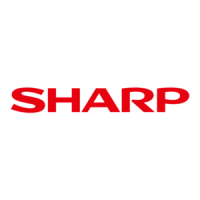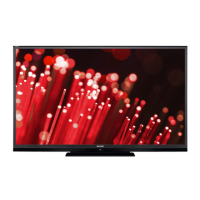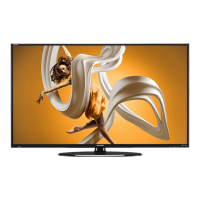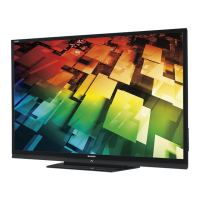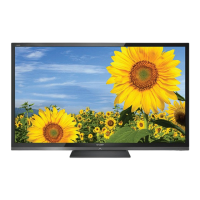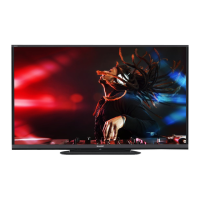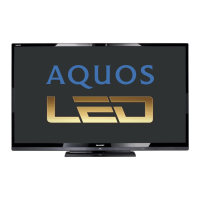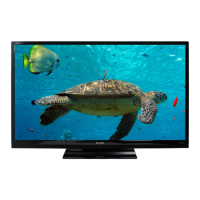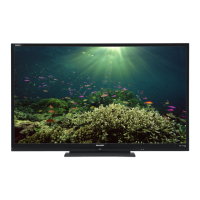Do you have a question about the Sharp Aquos LC-60LE660U and is the answer not in the manual?
Identification of TV parts including front, side, and rear views.
Identifies buttons and functions of the remote control.
Further explanation of remote control buttons and their specific operations.
Steps to select and display images from connected external sources.
Initial setup process for language, location, and time zone.
Continues initial setup for Daylight Savings Time and TV location mode.
Configuration for Antenna/Cable, Set-top box, Air/Cable connections.
Performing channel auto search and initial Smart TV setup.
Steps for establishing wired or wireless network connections.
Confirming initial setup completion and input source switching.
Methods for changing TV channels using number buttons and other keys.
How to increase or decrease the TV's audio volume.
Function to silence the TV's current sound output.
Capability to capture and freeze a moving image on the screen.
Switching to the previously tuned channel or input mode.
Accessing and activating various TV applications via SmartCentral.
Accessing the Netflix screen for streaming services.
Selecting audio modes for stereo, SAP, and digital broadcasts.
Setting a timer for the TV to automatically switch to standby.
Choosing viewing options to match the environment or content type.
Details on STANDARD, MOVIE, PC, USER, and DYNAMIC AV modes.
How to enable and select closed caption subtitles.
Further details on digital closed caption services and display options.
Options for selecting different screen sizes for viewing content.
Visual examples of screen size adjustments for various programs.
Screen size adjustments specific to PC input signals.
Overview of the on-screen display, guide, and menu navigation symbols.
Explanation of menu items and the LC Font technology used.
Step-by-step guide for navigating and adjusting menu settings.
Details on using remote control and TV panel buttons for menu operations.
Comprehensive guide through the TV's initial setup process.
Setting language preferences and configuring TV channel setup.
Setting favorite channels and configuring digital antenna reception.
Setting a secret number to protect TV settings and enable V-Chip.
Explanation of TV Parental Guidelines and content rating systems.
Canadian rating systems and how to temporarily release V-CHIP block.
Reactivating V-CHIP block and configuring Quick Start Mode.
Settings for HDMI auto view, digital audio output, and audio select.
Adjusting color system, LINK setup, and fine sync for PC input.
Viewing TV software version and digital caption information.
Procedures for updating TV software using a USB memory device.
Steps for updating software via network and manual USB methods.
Adjusting picture preferences like backlight, contrast, and brightness.
Fine-tuning picture quality with motion enhancement and noise reduction.
Adjusting color tone, saturation, value, and color temperature.
Settings for active contrast, film mode, and monochrome viewing.
Adjusting treble, bass, balance, surround, and auto volume.
Accessing main Smart TV settings, dashboard, and internet setup.
Setting standby wallpaper and selecting image data sources.
Miracast device connection and TV name setting.
Controls for power saving, view mode, and audio settings.
Caption setup, startup screen, and demo mode configuration.
Connecting USB devices or Home Network servers for media playback.
Navigating and selecting folders for media playback from USB/network.
Details on supported video file formats and codec compatibility.
Photo mode operations and thumbnail viewing controls.
Operations for viewing photos in a slide show format.
Controls for playing audio files in music mode.
Controls for playing video files in video mode.
Detailed remote control functions for media playback modes.
Programming the remote to control other AV devices via manufacturer codes.
Manufacturer codes for presetting remote control functions for BD/DVD/LD.
Manufacturer codes for presetting remote control functions for VCR and audio.
Remote control functions for connected devices like STB, BD, DVD, VCR.
How to use LINK Operation to control HDMI-CEC compatible devices.
Configuring LINK settings and enabling auto power on feature.
Accessing and using the Link Operation Menu for device adjustments.
Options within the Link Operation Menu for audio output and device selection.
Connecting a smartphone via MHL for content viewing and remote control.
Adjusting PC image position, auto sync, clock, and phase settings.
Configuring audio input terminals for PC connection to the TV.
Controlling the TV via RS-232C or IP connection from a PC.
Command table and procedure for controlling TV via PC for power and input.
Commands for AV mode, volume, position, clock, phase, and view mode.
Commands for surround, audio selection, sleep timer, and channel control.
Commands for software version, IP protocol, CC, device name.
Command list for remote control buttons used in PC control.
Table detailing PC resolutions and frequencies for compatibility.
Requirements and methods for connecting the TV to the Internet.
Steps for configuring Internet access settings via menus.
Detailed wireless setup procedures, including WPS and network selection.
Manual IP address configuration for Internet access.
Using the on-screen keyboard for text input in network settings.
Details on Enter, Clear, Space, and Close functions of the software keyboard.
How to launch and navigate the web browser using the remote.
Browser toolbar functions and steps for browsing web content.
Cautions, links, and disclaimers related to internet browsing.
How to check or modify browser settings from the Browser menu.
Using external keyboard and mouse with the TV browser.
Accessing and managing internet applications via the application window.
Deactivating Netflix/VUDU and using AQUOS Advantage Live.
Disclaimers and examples of application logos for internet services.
Connecting and using Miracast-compatible smartphones or tablets.
Step-by-step guide to safely detach the TV stand from the unit.
Instructions for wall mounting using an optional bracket and safety advice.
Details on AC cord holder location for wall mounting.
Specifications and dimensional drawings for wall mount kits.
Important notes and warnings for wall mount installation safety.
Solutions for common TV operational problems like no power or picture.
Solutions for audio issues, Miracast problems, and environmental cautions.
Technical specifications for LE660U and C6600U TV models.
Technical specifications for LE661U TV models.
Detailed specifications for the TV's wireless LAN function.
List of registered trademarks, software components, and ENERGY STAR info.
Diagrams showing dimensions for 70-inch models and wall mount bracket.
Diagrams showing dimensions for 60-inch models and wall mount bracket.
Information on software components, copyrights, and license agreements.
License details for Libmng, Libupnp, and libjpeg software components.
Licenses for mongoose, Qt GUI Toolkit, Webkit, libfreetype, libxml2, curl.
GNU GPL, GNU LGPL, and SSLeay license terms and conditions.
Apache License, DejaVu fonts, and Arev Fonts copyright information.
GPL terms for redistribution, liability, and warranty disclaimers.
Detailed terms of the Apache License for font software.
Detailed terms and conditions for the GNU Lesser General Public License.
Additional LGPL terms for combined works and library facilities.
Preamble and definitions for the GNU General Public License.
Basic GPL permissions, source code definition, and user interface requirements.
GPL terms for verbatim copies, modified versions, and non-source forms.
GPL terms for user products, installation, and liability limitations.
GPL terms for patent licenses, termination of rights, and liability.
GPL terms regarding patent reliance and disclaimer of warranty.
GPL limitation of liability and interpretation of warranty disclaimer.
| Screen Type | led |
|---|---|
| Wall Mount | 400mm x 400mm |
| Screen Size | 60.09 inches, 60 inches |
| Refresh Rate | 120hz |
| USB Ports | 1 |
| RF Antenna | yes |
| Headphones Output | no |
| Digital Optical Audio Outputs | 1 |
| Analog Audio Outputs | 1 |
| Component Video Inputs | 1 |
| Composite Video Inputs | 1 |
| DVI | 0 |
| Remote Control | universal |
| 3D | no |
| Width with Stand | 53.36 inches |
| Depth without Stand | 3.38 inches |
| Height without Stand | 31.19 inches |
| Net Weight without Stand | 52.9 pounds |
